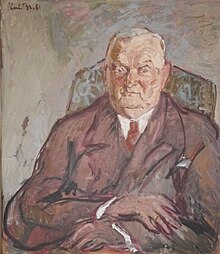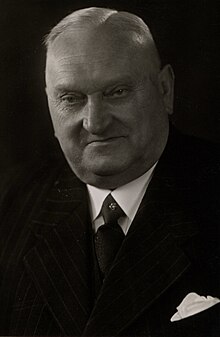Franz Bornefeld-Ettmann
Franz Bornefeld-Ettmann (born January 16, 1881 in Bornefeld near Wadersloh , Beckum district , † January 21, 1961 in Wadersloh) was a German farmer and politician ( center ).
Live and act
Bornefeld-Ettmann attended elementary school until 1890, the rectorate school until 1895, and finally studied privately until 1898. From 1899 he attended an agricultural school. From 1900 to 1901 he volunteered on various estates in the Rhine Province . In 1907 he took over his father's farm. He paid particular attention to pig breeding .
“From a young age he devoted himself to public affairs in his home country. In 1911 he was elected to the board of directors of the Wadersloh dairy cooperative, and in 1919 he was elected chairman. From 1917 to 1918 he was a district auditor for the dairies in the Beckum district . In 1919, the then President of the Province of Westphalia appointed him his dairy consultant. In 1920 Bornefeld-Ettmann founded the dairy teaching and research institute in Münster, as well as the construction and machine advice center as an aid to the establishment and establishment of dairy operations.
In 1920 he became director of the Meierei-Verband für Westfalen and Lippe and in this capacity founded the buying and selling cooperative of Westphalian dairies in Münster, which he made an efficient institution up to the forced resignation in 1933. He also founded the Rhenish-Westphalian sales center for dairy products and was the first president of the Rhenish-Westphalian Dairy Association until April 1933.
From 1923 to 1953 Bornefeld-Ettmann was chairman of the board of the Westfälische Central-Genossenschaft in Münster and from 1928 to 1933 President of the Association of Rural Cooperatives of the Province of Westphalia. From 1928 to 1933 he was also a member of the supervisory board of the Ländliche Centralkasse and a member of the supervisory board of the Westphalian Provincial Viehverwertungs-Genossenschaft. At that time Bornefeld-Ettmann was also a member of the board of directors of the Reichsviehverwertung in Berlin and member of the board of directors of the Reich Association of German Agricultural Cooperatives, Berlin, as well as co-founder of the insurance company of the rural cooperatives, today's Raiffeisendienst. He was a member of the Westphalian Chamber of Agriculture, a board member of the Association of German Christian Farmers 'Associations and chairman of the dairy farming committee of this farmers' association. From 1919 to 1933 he was a member of the German Reichstag. As a member of the Reichstag, Bornefeld-Ettmann developed a lively activity for German agriculture in conjunction with his friends Herold and Blum. He played a leading role in the creation and commentary on the Reich Milk Law of 1930, which created the prerequisites for putting German agriculture on a new organizational and economic basis and which, with Section 38, laid the foundation for the later market organization that would apply to Germany Agriculture is still effective. He was also significantly involved in the formulation of the implementing regulations. During this work he came into closer contact with Heinrich Lübke . On the initiative of Bornefeld-Ettmann, a number of larger closed settlements in Silesia, Pomerania and Mecklenburg have emerged.
In March 1933, Franz Bornefeld-Ettmann had to resign from all his honorary posts under National Socialist pressure. A lawsuit was brought against him, but he was acquitted of proven innocence. In the course of the assassination attempt on July 20, 1944 , he was arrested and taken to the Münster prison.
After the end of the Second World War he took over the administration of Wadersloh. He was reinstated in the office of President of the Association of Rural Cooperatives and was unanimously elected President by Association Day in 1946. He resigned this office in 1952 and was unanimously elected honorary president of the Association of Rural Cooperatives on the relevant association day; he remained a member of the Association Committee and the Administrative Committee. Bornefeld-Ettmann also suggested the re-establishment of the Westphalian-Lippian Agricultural Association, invited to a founding meeting and chaired it. He was active again on the supervisory board of the Ländliche Centralkasse Münster, on the board of the Westfälische Provinzial-Viehverwertungsgenossenschaft Münster, on the supervisory board of the Raiffeisen service and on the central committee of German agriculture. In the years after 1949 he helped set up the cooperative institute at the University of Münster. "
After the First World War , Bornefeld-Ettmann moved in 1920 as a member of the Center Party in the 1st German Reichstag , in which he represented constituency 19 and, from 1924, constituency 17 (both North Westphalia). He was re-elected a total of seven times by 1933, making him one of the few members who sat in the German Reichstag without interruption for the entire duration of the Weimar Republic from 1920 to 1933. In 1933, although he was an opponent of National Socialism, he voted for the Enabling Act together with the other members of the center parliamentary group . On May 30, 1930 he was appointed by Pope Pius XI. appointed "Knight and Commander of the Order of the Holy Pope Silvester ".
According to a book by the historian Walter Hösterey , Bornefeld-Ettmann was exposed to "multiple tribulations" during the further duration of the National Socialist regime, but "held up excellently".
In 1946 Bornefeld-Ettmann received together with Dr. Johannes Hasenkamp and Friedrich Leopold Hüffer received the license to publish a new newspaper in Germany through the British occupation government. The result was the Westfälische Nachrichten , which first appeared on August 3, 1946.
In addition, Bornefeld-Ettmann was association director and later honorary president of the Association of Rural Cooperatives of the Province of Westphalia and board member of the WPVG. In addition, he worked as a director of the rental association for Westphalia, Lippe and Waldeck and as a committee member and board member of the Westphalian farmers' association . In old age he was made an honorary citizen of the Westphalian Wilhelms University in Münster . He was also awarded the Great Cross of Merit of the Federal Republic of Germany in 1952 and later (1960) the Great Cross of Merit with a Star.
Fonts
- 100 years Kreissparkasse Büren Iw In the service of the homeland: 1856-1956 , 1956. (Together with Otto Schnettler, Gottfried Wand)
Web links
- Literature by and about Franz Bornefeld-Ettmann in the catalog of the German National Library
- Franz Bornefeld-Ettmann in the database of members of the Reichstag
Individual evidence
- ↑ Excerpt from the speech of the Prime Minister of North Rhine-Westphalia Dr. Franz Meyers on the occasion of the award of the star for the Great Cross of Merit of the Federal Republic of Germany on January 16, 1960.
- ^ Walter Hammer / Walter Hösterey: Hohes Haus in Henker's hand , 1956, p. 31.
- ^ German Society for Fat Science: Fette, Seifen, Anstrichmittel , 1961, p. 316.
| personal data | |
|---|---|
| SURNAME | Bornefeld-Ettmann, Franz |
| BRIEF DESCRIPTION | German politician (center), MdR |
| DATE OF BIRTH | January 16, 1881 |
| PLACE OF BIRTH | Bornefeld near Wadersloh |
| DATE OF DEATH | January 21, 1961 |
| Place of death | Wadersloh |


